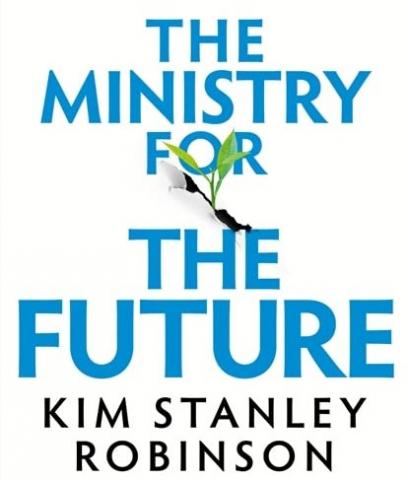Catching up with Robinson
Submitted by Kimon
Some time after the COP26 climate conference in Glasgow in November and some time ahead of The High Sierra: A Love Story book publication in May, let's catch up on all things Kim Stanley Robinson -- mainly around his latest, The Ministry for the Future. And there's been a lot to report!
First, interviews and events.
The New Yorker did an extensive profile on KSR: Can Science Fiction Wake Us Up to Our Climate Reality?
...where KSR, historian Mario Biagioli (behind much of the halp KSR got for Galileo's Dream) and the article writer Joshua Rothman go hiking in the Sierras!
Many of Robinson’s novels are essentially love stories in which friends grow enamored of one another and of the landscapes they explore; I could see that the dynamic was taken from life.
For the Los Angeles Review of Books, Everett Hamner conducted an interview with KSR, where they go in great detail about plot and character of many of his novels: Odd Couples, Carbon Coins, and Narrative Scopes
One change in my thinking came after finishing Red Moon, with the feeling I needed to go right to the heart of the story and not work on the margins any longer. (The moon is particularly marginal.) Another was the very strong impression that if, or when, people suffer a bad enough climate disaster, things will change. Then I began imagining a future history that felt real and yet ended up in some kind of “best case scenario” space — that was my challenge for this project.
Of particular interest to Ministry and its focus on India, KSR was interviewed by Raghu Karnad for The Indian Express: ‘The first to go green will do the best afterwards’
The boldest countries will be the most successful later in the twenty-first century. It can’t be emphasized enough: the first to go green will do the best afterward.
Daniel Aldana Cohen interviewed KSR for Jacobin, a broad and extensive piece well worth a read: Kim Stanley Robinson on Science Fiction and Reclaiming Science for the Left
There’s a category error in thinking that science is just part of capitalism. Calling people “elites” is now a way to attack them. The 1 percent, the people in power, are elites, but are scientists elites? Are university professors elites? Kind of, yes. The word masks a divergence of projects between people who are rich, who want to retain power, and therefore hire lawyers and lobbyists in order to keep their power by killing tax laws, but also experts, scientists, and technocrats who work to make things better.
The term “elites” confuses the issue, demonizing the experts who are absolutely necessary to the work of getting to a better place, as well as the reactionary forces, the people who only want to hold on to their riches for one more generation.
This also resulted into an interview/article at The Guardian: How will humanity endure the climate crisis? -- and an interview at The Dig podcast: Near Futures
KSR was interviewed by the Green European Journal: How We Put Out the Fire
What needs to happen to make this a turning point for the world?
More awareness, more analysis, more flexibility. The creation of working political majorities in all the major economies, towards taking immediate, strong action in coordination with all other nations through the Paris Agreement. Central banks helping to concoct a new political economy in which money is moved away from carbon-burning activities into decarbonisation. All this will need to be led by the people telling their political representatives to do it. Resistance to all nativist authoritarian leaders encouraging tribalism and ignoring the climate problem; these forces are strong, and they need to be defeated.
Chatham House's The World Today magazine included an Interview: Kim Stanley Robinson (subscription required)
Some video interviews:
KSR was interviewed by Vishnu Som for Be INSPiRED, an Indian documentary series by Teamwork Arts: Finding Our Place in the Universe -- about space exploration, his writing about India and more (YouTube video, Facebook video) -- a welcome international outreach for his work.
KSR had the closing keynote at the Boulder Forum on Economy, Climate and Community -- there's a video of event (Vimeo) and a recap.
KSR delivered a lecture to the University of Sydney's Progress in Political Economy: Dodging a Mass Extinction Event: Climate Change and Necessity (YouTube video) -- KSR has been talking about political economy as separate from economics for a while, as far back as the 40/50/60 trilogy and earlier.
KSR spoke at the Berggruen Institute's Possible Worlds series, on Optopia: From Fiction to Action on Climate Change (YouTube video).
More recently, KSR spent an evening with Fossil Free California, where he talked about COP26 and Ministry (YouTube video) -- see also a review of the event.
On for some (audio) podcasts:
On The New Yorker's Politics And More podcast, Kim Stanley Robinson on "Utopian" Science FIction
NPR's Here & Now conducted an interview with KSR: Novelists illustrate the climate futures that could await us (at NPR)
Literature exists to give our lives meaning. It's the stories we tell each other, and literature is the finest stories we have. [...] a kind of realism of our time will become climate fiction by default, because that's the overriding reality of the next few decades and fiction that tries to pretend that it's all about your individual problems without getting to the social and the planetary is a diminished form and not doing its job.
KSR was interviewed by the How We Survive podcast: What Sci-Fi can teach us about the climate crisis
CBC's Ideas podcast: The Best-Case Scenario You Can Still Believe In
KSR was on the Bold.ly Now Show/podcast: Transcending the Climate Crisis with Kim Stanley Robinson (also available as a YouTube video)
...and on the next article we are going to be looking at KSR's trip to COP26 itself.
